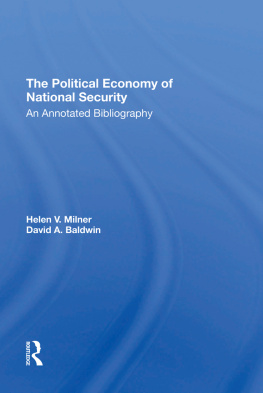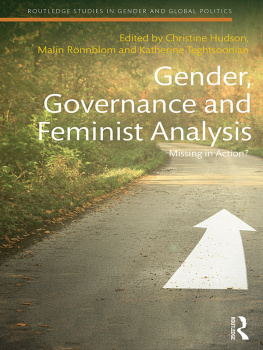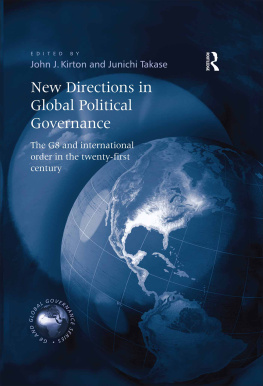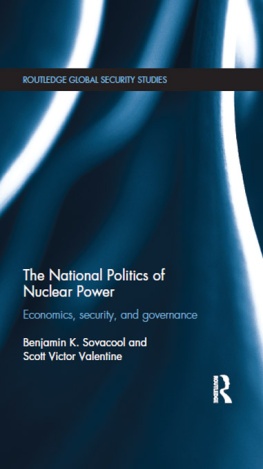Table of Contents
THE FIRST
POLITICAL ORDER
THE FIRST
POLITICAL ORDER
How Sex Shapes Governance
and National Security Worldwide
VALERIE M. HUDSON
DONNA LEE BOWEN
PERPETUA LYNNE NIELSEN
Columbia University Press
New York
Columbia University Press
Publishers Since 1893
New York Chichester, West Sussex
cup.columbia.edu
Copyright 2020 Columbia University Press
All rights reserved
E-ISBN 978-0-231-55093-2
Library of Congress Cataloging-in-Publication Data
Names: Hudson, Valerie M., 1958- author. | Bowen, Donna Lee, 1947- author. | Nielsen, Perpetua Lynne, author.
Title: The first political order: how sex shapes governance and national security worldwide / Valerie M. Hudson, Donna Lee Bowen, Perpetua Lynne Nielsen.
Description: New York: Columbia University Press, 2020. | Includes bibliographical references and index.
Identifiers: LCCN 2019028604 (print) | LCCN 2019028605 (ebook) | ISBN 9780231194662 (cloth) | ISBN 9780231550932 (ebook)
Subjects: LCSH: Sex discrimination against womenHistory. | Sex roleHistory. | Womens rightsHistory. | Social structureHistory. | National securityHistory.
Classification: LCC HQ1237 .H93 2020 (print) | LCC HQ1237 (ebook) | DDC 305.4209dc23
LC record available at https://lccn.loc.gov/2019028604
LC ebook record available at https://lccn.loc.gov/2019028605
A Columbia University Press E-book.
CUP would be pleased to hear about your reading experience with this e-book at .
Cover design: Catherine Casalino
Frontispiece: Statue of grieving woman holding an ouroboros, Verano Cemetery, Rome, Italy.
Photograph by Douglas Keister.
CONTENTS
G iven the wide-ranging nature of this book, we have many individuals and organizations to thank.
First, we would like to thank our sponsors. In the first place, this includes the U.S. Department of Defense, which provided funds for our data collection and scalings through the U.S. Army Research Laboratory and the U.S. Army Research Office via the Department of Defenses Minerva Research Initiative under grant number W911NF-14-1-0532. Hudson would also like to thank the Andrew Carnegie Corporation for their supportive fellowship in the social sciences, which allowed her release time to write. The authors gratefully acknowledge the support of the Compton Foundation and are deeply appreciative for their unfailing enthusiasm and support for our work. At Brigham Young University, we would like to thank the David M. Kennedy Center for International Affairs, the College of Family, Home, and Social Sciences, the Department of Political Science, the Department of Geography, the Department of Statistics and the Womens Research Initiative for their support. At Texas A&M University, we would like to thank the Department of International Affairs, as well as The Bush School of Government and Public Service within which that department is housed, for their support. The views expressed herein are our own and do not represent the views of these organizations.
.
There are many researchers whose work has inspired our own. Indeed, they may or may not even know how much their work meant to us. We would include in this group scholars such as Ariel Ahram, Victor Asal, Elin Bjarnegard, Mary Caprioli, Mounira Charrad, Andrea Den Boer, Cynthia Enloe, Patricia Gowaty, David Jacobson, Ann Jones, Mary Hartman, Theodore Kemper, Gerda Lerner, Erik Melander, Rose McDermott, Robin Morgan, Susan Moller Okin, Carole Pateman, Malcolm Potts, Peggy Reeves Sanday, Barbara Smuts, Rebecca Solnit, Gloria Steinem, Ann Tickner, Jacqui True, Mark Weiner, and Richard Wrangham.
Patricia Gowaty, Dan Reiter, Alison Brysk, and Khandis Blake are endeared to us forever for reading the entire final draft of the manuscriptyou cannot know how much your enthusiasm and support bolstered our spirits! We also thank the two anonymous reviewers who each offered excellent advice for improving the draft. A special shout-out goes to Caelyn Cobb of Columbia University Press who saw the promise of this book, and who also provided extremely helpful editorial advice throughout the process.
We also thank Laurie Weisler, Tiffany Huff, and Carina Alleman (and her redoutable assistants) for their support, without which we would have spent far more time on administration and bibliographic formatting than on writing. And we thank Marijke Breuning, without whose initial encouragement of our work, we might never have reached this point. We also thank Michael Geary, who unfailingly and swiftly fixed any glitches with our online database and map generator that hindered our progresseven while on vacation!
Finally, we would like to thank our families who made this work so meaningful to our lives. Hudson would like to thank her husband David, and children Joseph, John, Thomas, Jamison, Rose, and Eve. Ariel, if you had been here, I am sure you would have helped us write this book. Bowen thanks her husband Jim. Nielsen is immensely grateful for her five children: Marc, George, Cinta, Brian, and Rebekah.
June 2019
Proverbs 8: 24, 36
A light went on for one of our coauthors, Valerie Hudson, one spring day more than a decade ago when she had the opportunity to have lunch with one of the first female Afghan ministers of parliament (MPs). As Hudson chirped about the growing empowerment of women in Afghanistan, as evidenced by the fact that her guest was university educated and an MP, the MP stopped her: Valerie, I could go home today, and my husband could divorce me by simply saying the phrase I divorce you three times. If he did, I would lose custody of my children and would have nowhere to live. Even if he does not divorce me, I may have little say in when and to whom my children are married. How empowered am I really, Valerie? Hudson was pulled up short. Although she was used to assessing womens empowerment through indicators such as educational attainment and political participation, she clearly had failed to consider something prior to and much deeper than these things. In a sense, this entire book emerged from that conversation of more than a decade ago.
In his 2015 study, Sapiens: A Brief History of Mankind, historian Yuval Noah Harari notes that throughout human history, the hierarchy of supreme importance in all known human societies is the hierarchy of sex. People everywhere have divided themselves into men and women. And almost everywhere men have got the better deal. So why is this the case, not just in one or two cultures, but almost universally? Why would men get the better deal not just in one place, but most everywhere? And why would this system be so stubbornly persistent, from the dawn of history even into the twenty-first century?
We aim to answer these questions in this book. Building upon, but then extending, decades of scholarship, we explain the causes of womens systematic subordination as an outcome of human societies dependence on men to defend their physical security. In particular, we uncover a deeply male security dilemma that guides the choice of security provision mechanism within most human societies even to this day. That preferred means is the male fraternal group. Men seeking their own security attempt to construct strong male-bonded alliances, typically based on patrilineal (agnatic) relationships, and these alliances strive for security through dominance. Of course, women have historically been an irreplaceable support to this security provision mechanism, as it is they who biologically reproduce the group, providing brothers and sons for this male alliance. The fraternitys dependence on women, we argue, leads to the necessity for men to control them. We analyze an interlocking set of eleven practicesremarkable in their consistency across space and time in human historythat simultaneously strengthen the patrilinealfraternal alliance structure, while profoundly subordinating women. We demonstrate that these practices remain common in todays world and that they cross geographic regions, ethnic groups, religious groups, and language groups.
















